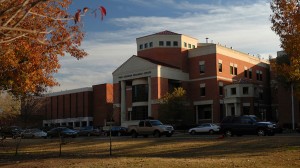OXFORD, Miss. – A process to evaluate research at the University of Mississippi School of Pharmacy has come full circle with a reorganization of the school’s departments.
The school recently changed from six departments to four.
“The School of Pharmacy is continually finding ways in which we can better support our world-renowned research enterprise,” said David D. Allen, the school’s dean. “We discovered that reorganizing was the perfect way to do just that. I applaud our faculty members for their efforts in making this vision a reality.”
The departments of Medicinal Chemistry, Pharmacognosy and Pharmacology, as well as the environmental toxicology research program, have been combined to form the Department of BioMolecular Sciences. Despite this change, students can still pursue master’s and doctoral degrees in medicinal chemistry, pharmacognosy, pharmacology and environmental toxicology.
The new department’s core mission is to educate pharmacists and scientists at the undergraduate, professional, graduate and postdoctoral levels to deliver health care and conduct research in basic, applied and translational pharmaceutical sciences in order to improve human health.
Also, the Department of Pharmaceutics was renamed the Department of Pharmaceutics and Drug Delivery. The departments of Pharmacy Practice and Pharmacy Administration remain unchanged.
In 2012, the school completed a research visioning process to drive research collaboration and focus. The process identified four target areas of research: cancer, cardiometabolic disorders, neuroscience/drugs of abuse and infectious diseases.
Following input from consultants and faculty members, a need was identified for departments that better support those research areas. A School of Pharmacy Reorganization Committee was appointed to recommend reorganization models. The committee was composed of pharmacy faculty members and administrators.
“I am so pleased with the committee’s work,” Allen said. “They did a great job of evaluating our current structure and providing input on how we could improve.”
The reorganization provides opportunities to advance the school’s teaching and research missions, said Stephen Cutler, chair of the Department of BioMolecular Sciences.
“This new design will allow us to map our professional curriculum beginning with anatomy/physiology through pathophysiology, medicinal chemistry and pharmacology, thus developing a solid foundation for pharmacy students,” Cutler said. “The graduate program will be strengthened through the integration of the basic science disciplines; pharmacology students will be learning side-by-side with medicinal and natural products chemists.
“Our research mission will be strengthened as we leverage the resources among the former departments into one cohesive unit. We are already beginning to see new collaborations with this restructure.”
The new name helps the public understand more about the faculty’s work, said Mike Repka, chair of the Department of Pharmaceutics and Drug Delivery.
“Though pharmaceutics somewhat implies drug delivery, our department has developed a unique specialty in that area,” Repka said. “Many of our faculty members are researching various delivery strategies for the skin, eye and oral mucosa, including novel technology associated with these targets. I’m pleased that we are able to articulate that to the public through our new name.”
